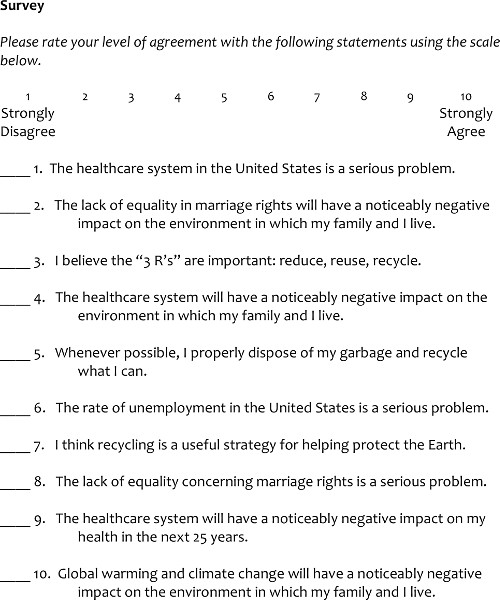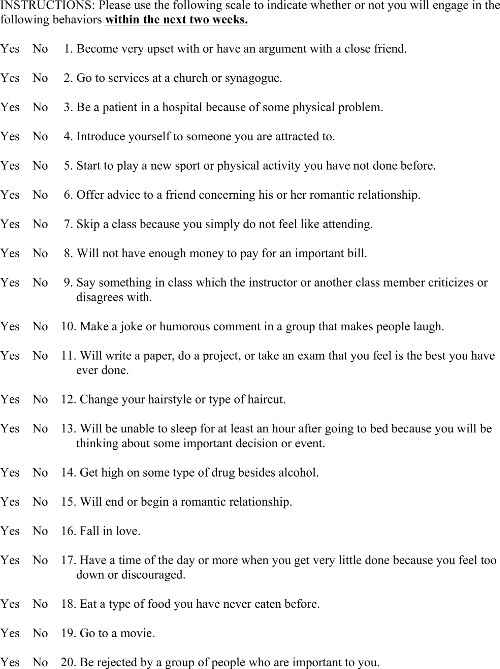Self-report vs. Behavioral Measures of Recycling
Source: Laboratories of Gary Lewandowski, Dave Strohmetz, and Natalie Ciarocco—Monmouth University
One of the challenges in measuring an experimental variable is identifying the technique that will produce the more accurate measurement. The most common way to measure a dependent variable is self-report—asking the participant to describe his/her feelings, thoughts, or behaviors. Yet, people may not be honest. To truly know something about a participant, it may be necessary to see what they actually do in a situation.
This video uses a multi-group experiment to see if feeling close to others results in more favorable attitudes toward environmental consciousness measured both by self-report and behavioral observation.
Psychological studies often use higher sample sizes than studies in other sciences. A large number of participants helps to better ensure that the population under study is better represented, i.e., the margin of error accompanied by studying human behavior is sufficiently accounted for. In this video, we demonstrate this experiment using just one participant. However, as represented in the results, we used a total of 186 participants to reach the experiment’s conclusions.
1. Define key variables.
- Create an operational definition (i.e., a clear description of exactly what a researcher means by a concept) of feeling close to people.
- For the purposes of this experiment, feeling close to people involves a perceived connection including feelings of emotional attachment toward another person or people.
- Create an operational definition (i.e., a clear description of exactly what a researcher means by a concept) of environmental con
This procedure was repeated 185 times so that the results reflect data from 186 total participants. This large number of participants helps to ensure that the results reflect accurate mean numbers of items recycled. If this research were conducted using just one or two participants, it is likely that the results would have been much different, and not reflective of the greater population. Numbers in Figure 1 reflect participants’ average responses for the recycling questions on the survey. Numbers
This multi-group experiment shows how participants’ feelings measured via a survey may not match up exactly with how they behave. In this case, participants reported more favorable attitudes (especially in the feeling-close-to-people condition), but when it came time to actually recycle, participants did not engage in the behavior.
This study replicates and extends previous research on self-reported recycling attitudes vs. actual recycling by Huffman et al., which showed that ac
- Huffman, A., Van Der Werff, B. R., Henning, J. B., & Watrous-Rodriguez, K. When do recycling attitudes predict recycling? An investigation of self-reported versus observed behavior. Journal of Environmental Psychology. 382, 62-270. doi:10.1016/j.jenvp.2014.03.006 (2014).
- Baumeister, R. F., Vohs, K. D., & Funder, D. C. Psychology as the science of self-reports and finger movements: Whatever happened to actual behavior?. Perspectives on Psychological Science. 2 (4), 396-403. doi:10.1111/j.1745-6916.2007.00051.x (2007).
- Lewandowski, G. W., Jr., & Strohmetz, D. Actions can speak as loud as words: Measuring behavior in psychological science. Social and Personality Psychology Compass. 3 (6), 992-1002. doi:10.1111/j.1751-9004.2009.00229.x (2009).
Vai a...
Video da questa raccolta:

Now Playing
Self-report vs. Behavioral Measures of Recycling
Experimental Psychology
11.8K Visualizzazioni

From Theory to Design: The Role of Creativity in Designing Experiments
Experimental Psychology
18.2K Visualizzazioni

Ethics in Psychology Research
Experimental Psychology
29.1K Visualizzazioni

Realism in Experimentation
Experimental Psychology
8.2K Visualizzazioni

Perspectives on Experimental Psychology
Experimental Psychology
5.6K Visualizzazioni

Pilot Testing
Experimental Psychology
10.3K Visualizzazioni

Observational Research
Experimental Psychology
13.0K Visualizzazioni

The Simple Experiment: Two-group Design
Experimental Psychology
72.2K Visualizzazioni

The Multi-group Experiment
Experimental Psychology
22.7K Visualizzazioni

Within-subjects Repeated-measures Design
Experimental Psychology
22.8K Visualizzazioni

The Factorial Experiment
Experimental Psychology
73.1K Visualizzazioni

Reliability in Psychology Experiments
Experimental Psychology
8.4K Visualizzazioni

Placebos in Research
Experimental Psychology
11.6K Visualizzazioni

Manipulating an Independent Variable through Embodiment
Experimental Psychology
8.5K Visualizzazioni

Experimentation using a Confederate
Experimental Psychology
17.8K Visualizzazioni

